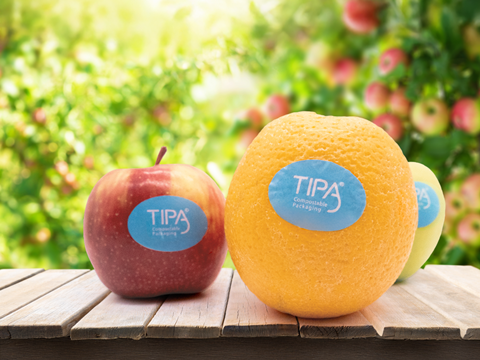
TIPA Compostable Packaging and its European subsidiary Bio4Pack have launched a new ‘certified home compostable’ label for fresh produce, suitable for a wide variety of fresh fruits and vegetables.
TIPA says the new produce label has excellent resistance to moisture while remaining flexible, and the pressure-sensitive adhesive allows for strong adherence on produce ranging from smooth banana and mango skins to the rough skins of oranges or cantaloupes, without leaving a residue on the produce.
The home compostable labels are also said to be compatible with conventional label printing presses; suitable for machine and hand application techniques; durable in cold and moist conditions and are certified as food-safe for direct food application.
“Labels on fresh produce have traditionally been made from conventional plastic that cannot be recycled and are often discarded in food waste bins, contaminating organic streams and contributing to microplastic pollution,” said Daphna Nissenbaum, co-founder and CEO of TIPA. She adds: “we’re excited to offer these produce labels as part of our growing portfolio of sustainable solutions that perform like conventional plastics, but meet today’s compostability standards.”
Earlier this year, TIPA introduced a home compostable high-barrier film for laminated savoury snack and crisp packaging, aiming to offer enhanced functionality and durability. The film is available globally for purchase in reels and when paired with cellulose or paper layers, it is said to make ‘one of the market’s thinnest’ 2-ply home compostable solutions for crisps, chips, and snacks.
In July, Huhtamaki revealed its new ice cream cups designed to be home and industrially compostable and recyclable. Made from ‘responsibly sourced’ certified paperboard, the cups contain a bio-based material coating as part of the company’s shift from fossil-based to bio-based plastics.
If you liked this story, you might also enjoy:
The ultimate guide to the Packaging and Packaging Waste Regulation in 2025
How are the top brands progressing on packaging sustainability?
Everything you need to know about global packaging sustainability regulation in 2025
The key to increasing the use of reusable packaging in supermarkets














No comments yet